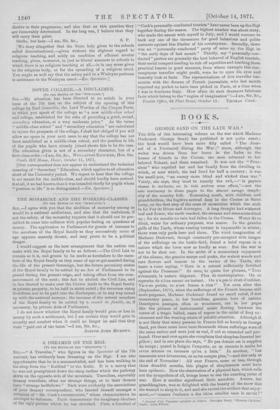THE MONARCHY AND THE WORKING-CLASSES.
[TO TIIII EDITOR OF TRH " STROW.TOR.1
Stu,—I agree with you that the abolition of monarchy among us would be a national misfortune, and also that the usefulness, if not the safety, of the monarchy requires that it should not be per- mitted to come into collision with popular feeling on questions of mousy. The application to Parliament for grants of incomes to the members of the Royal family as they successively come of age appears scarcely decent, and may prove to be a political danger.
I would suggest as the best arrangement that the nation can make with the Royal family to be as follows :—Tbe Civil List to remain as it is, and grants to be made as heretofore to the mem- bers of the Royal family as they come of age or get married during the life of the present Sovereign, but the future pecuniary status of the Royal family to be settled by an Act of Parliament to be passed during the present reign, and taking effect from the com- mencement of the next ; this Act to abolish the Civil List, and in lieu thereof to make over the Crown lands to the Royal family as private property, to be held in strict entail ; the revenues rising therefrom not to be paid into the Exchequer, or in any way mixed up with the national moneys ; the incomes of the several members of the Royal family to be settled by a conseil its fanatic, or, if necessary, by private Acts of Parliament.
I do not know whether the Royal family would gain or lose in money by such a settlement, but I am certain they would gain in security and comfort when it could no longer be said that they were " paid out of the taxes."—I am, Sir, &c.,
JOSEPH Joux MURPHY.


































 Previous page
Previous page